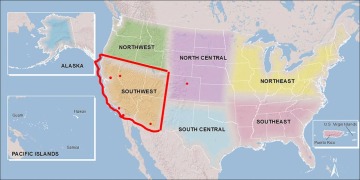Native Americans in the Southwest are vulnerable to climate change because of their intimate relationship with the environment upon which their culture, tradition, and livelihood depend. Climate change may overwhelm tribes already stressed by economical and development challenges. A primary example is Nevada’s largest tribe, the Pyramid Lake Paiute Tribe, located at the terminal end of the Truckee River Basin, who are deeply connected—culturally, physically, and spiritually—to Pyramid Lake and its ecosystem.

Pyramid Lake is home to the endangered cui-ui fish (Chasmistes cujus) and the threatened Lahontan cutthroat trout (Oncorhynchus clarki henshawi) shown above - two important cultural resources to the Pyramid Lake Paiute Tribe. Despite more than a century of upstream water diversions for agricultural and municipal purposes, the Pyramid Lake Paiute Tribe has been able to secure their tribal water rights and protect the Lake and its ecosystem.
Nevertheless, the Pyramid Lake Paiute Tribe, like other Southwest tribes, may be disproportionately impacted by flooding and droughts brought on by climate change (Redsteer et al. 2013) due to undeveloped or non-existent water management infrastructure. While climate change studies for the Truckee River Basin have been done, a climate change adaptation study that incorporates tribal perspectives is lacking. Researchers have found that conventional climate change adaptation planning may have unintended consequences for tribes and may lead to conflict if tribal consultation is not considered (Redsteer et al. 2013).
This project addresses the need for tribal climate change adaptation planning in the region, and the primary objectives are to:
-
Determine the potential of the Pyramid Lake Paiute Tribe to adapt to climate change by understanding vulnerabilities, thresholds, and resiliencies of the systems
-
Propose collaborative tribal water management and adaptive strategies for the Pyramid Lake Paiute Tribe
-
Produce a framework for a decision support system model of a coupled climate-biophysical-social system
-
Explore the potential for effective partnerships and collaborations between tribes and scientists
This research project is a collaborative effort between the Pyramid Lake Paiute Tribe, the University of Arizona, the University of Nevada Las Vegas, and the U.S. Geological Survey. Funding for this project comes from a two-year grant from the U.S. Geological Survey Southwest Climate Science Center (SWCSC). Full description of this project at the SWCSC website.

The image above shows a map of the eight Climate Science Center regions in the U.S. The Southwest Climate Science Center, outlined in red, is a consortium of six host institutions: University of Arizona; University of California, Davis; UCLA; Desert Research Institute, Reno; University of Colorado, Boulder; & Scripps Institution of Oceanography at the University of California, San Diego (doi.gov).
Previous Climate Change Vulnerability Study carried out at the Pyramid Lake Paiute Tribe
This research will build on the results from a previous analysis of the Pyramid Lake Paiute Tribe's vulnerability to climate change. This study was conducted by Drs. Mahesh Gautam, Karletta Chief, and William J. Smith, Jr. through a NSF Nevada EPSCOR seed grant. The results of this analysis were published in the journal Climatic Change in a special issue on "Climate Change and Indigenous Peoples in the United States: Impacts, Experiences, and Actions." The article can be downloaded.
The results of this study were also presented by Dr. Karletta Chief at the Second International Climate Change Adaptation Conference at the University of Arizona in 2012. Full video presentation.
